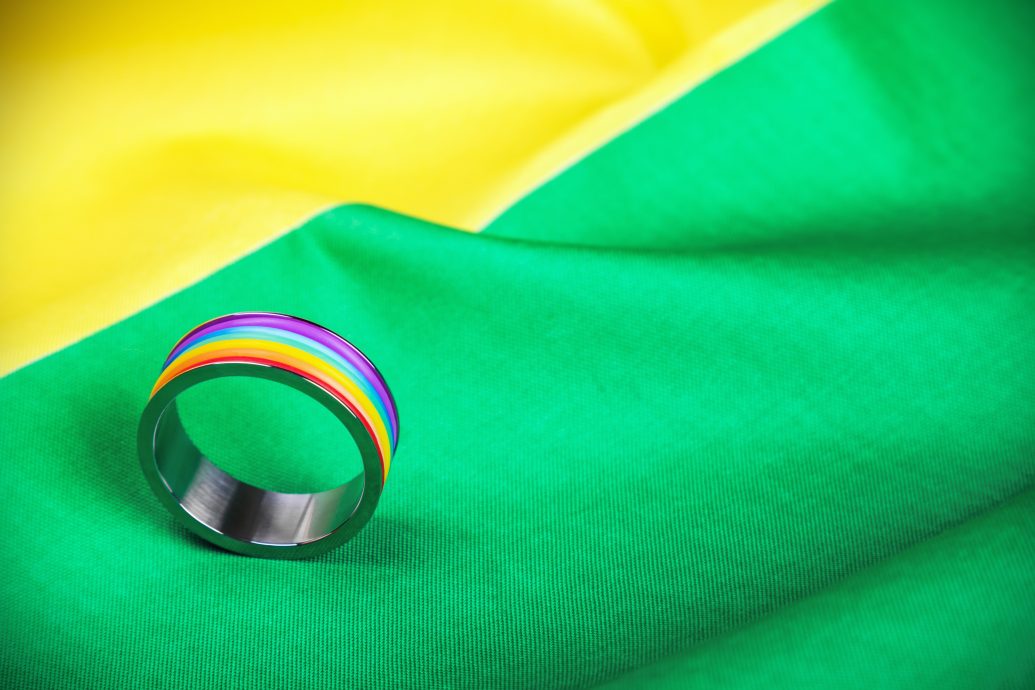Judge Kavanaugh's future record on religious liberty cases will likely resemble that of Justice Kennedy.
The Rigors of Boringly Bourgeois Marriage
Over the last decade or so, the gay rights movement made a politically canny adjustment: It began featuring lesbian and gay families who wanted to enter the American mainstream, and the outré postmodernists were less heard from. By outré postmodernists I mean those whose views were unlikely to play well in Peoria. For example:
We have for now lost the opportunity to explore the possibilities of a “lawless homosexuality” that is neither regulated by criminal sodomy laws nor licensed by civil marriage laws. What . . . might be the costs [of legal recognition of same-sex relationships]? . . . New kinds of fantasmatic curiosities might both be foreclosed or wither as our curiosity gets channeled or tamed in the direction of the familiar, the safe, and the respectable nuclear family.
Well, they’re back. The above is from Katherine Franke’s Wedlocked, a book about “the perils of marriage equality” or, in the words of its second subtitle, “how African Americans and gays mistakenly thought the right to marry would set them free.”
The Columbia University law professor and lesbian activist rains on the Obergefell parade. “Gaining marriage rights may threaten the gay community’s own history and values,” she says. Homosexuals should not have so eagerly strapped on the fetters of an institution made by and for white heterosexuals. She worries that it may not be a good deal for gays and lesbians since, according to her, it didn’t turn out to be a good deal for black folks after slavery was abolished in the United States.
That this linkage has problems the author well knows. She swears she does not mean to equate the treatment of African Americans by the white majority in the 19th century with the treatment of gays by the straight majority today but is merely juxtaposing them. However, there is a constant showing of similarities, hearing of “echoes,” and extraction of “lessons” gays are advised to take from studying the earlier struggle. The cumulative effect is that the two are being equated.
It is certainly not wrong to speak of the resilience of black families down the generations. Franke goes on, however, to idealize “ ‘Living apart together’ or LAP relationships” and to make instability out to be a virtue, meanwhile leaving entirely out of the picture drugs and their ill effects on communities, families, and individuals. Diverse family forms among gays and lesbians also get a feisty defense, in nearly the same breath. She even delves into the (to her) infamous Moynihan Report of 1964 to set the table for deploring what she calls “a gay Moynihan moment”—when a collection of straight liberals (the American Psychological Association) did their patronizing best to help gay families by imposing on them the standard of the straight nuclear family.
The postmodern theorizing sprinkled in among the research findings is irritating, all the more so since Franke gleaned interesting information by combing through archives from the Civil War and Reconstruction. Her research led her to the legal tangles in which African Americans were caught after being granted legal recognition of their marriages at the end of the war.
When the states rejoining the Union passed laws regularizing the relationships of formerly enslaved men and women, many were not aware of their official married status because they were illiterate. Getting automatically swept into the institution of marriage led, in several cases Franke describes, to their being hauled in by the authorities for bigamy or adultery if they took up with other partners. And prison led to labor in a chain gang, a return to a kind of slavery. The widows of ex-slaves who died fighting for the Union faced procedural obstacles to collecting the government pensions they were owed. Husbands and wives in Mississippi complained to Freedmen’s Bureau agents that the state was taking their children away from them on trumped up charges of being too poor to support them.
What Franke is driving at with these accounts, which in and of themselves are well worth reading, is that admitting gays into the institution of marriage leaves gays, too, vulnerable to being tripped up:
Same-sex couples would be well counseled to prepare for the ways in which a marriage license inaugurates new forms of state discipline and regulation that can be easily deployed in the service of a durable and crushing homophobic itinerary.
Wedlocked delves into slavery, marriage, family law, race-related and homosexuality-related Supreme Court cases, all the while not saying—until an oblique reference midway through and a direct statement toward the end—that the main defense, today, of traditional marriage is that marriage’s purpose is to tie together gamete-contributors so they will take care of the children they produce. Avoiding acknowledgment of this argument (one that I have made) blurs the contours of the debate. The basic reproductive difference between the racial minority Franke writes about and the sexual minority she writes about is in this way obscured.
She’s quite clear on people who disagree with her—defamatory, even. Prominent opponents of same-sex marriage are likened to Klansmen and the late extremist Fred Phelps of the Westboro Baptist Church on no evidence. At other times, her tendentiousness can be funny. Of the two Anthonys, Kennedy and Weiner, who make their appearance in Wedlocked, which would you suppose the good Anthony and which the lame-o one? Guess again. The ex-congressman (D-N.Y.) “may be more of an ally in the cause to defend sexual liberty than are marriage equality advocates” because his digital sharing of certain images reaffirmed public “erotic inclinations” precisely at a time when “homosexuals were busy domesticating their sexuality in the private domain of the family.” (Full disclosure of the dissociative sort: liberty-defender no relation to this reviewer.)
As for Justice Kennedy, he is dissed as one of those liberals who thinks he’s being helpful but is really being overbearing. “The narrative Justice Kennedy began telling about us in Lawrence”—meaning Lawrence v. Texas, the 2003 decision overturning sodomy laws—was that “the Constitution stands to protect us so long as we can plausibly discipline our desires into the form of kinship. Sex for its own sake remains without constitutional protection.”
In this farrago of a book containing everything from the sublime to the ridiculous, the author sometimes hits the nail on the head. Justice Kennedy actually is a liberal who thinks he’s being helpful but is really overbearing. Obergefell shows that. It has a flimsy constitutional warrant. She wouldn’t say that, to be sure. She’s a Living Constitution person all the way; still her analysis of legal and political developments is trenchant in more than a few places. Some of her criticisms of the drive for same-sex marriage—and of some gays and lesbians who have leapt into marriage—are valid as well.
For example, advocates insisted they were pushing only for the choice to marry, and gave assurances that no one was being dragooned into making this choice. (See Jonathan Rauch in this 2013 panel discussion at 22:50, 23:08, and 1:06:10.) Franke points out instances where employers cancelled benefits for same-sex couples in domestic partnerships or civil unions when gay marriage came to their states, preferring to extend the benefits only to those gay employees who married. Some people were indeed being corralled into marriage. In the future, some may be left out in the cold regarding parental rights or other matters, she plausibly suggests, if they hold themselves aloof from marriage.
Unusual prenuptial agreements entered into by same-sex couples are described in the book, such as one man’s stipulation that a $100,000 fine be levied on his soon-to-be spouse in the event that the latter committed adultery, and another prenuptial agreement under which neither spouse was required to be monogamous. Franke asks whether these couples ought not bethink themselves and possibly forgo marriage, if they would redefine its expectations and duties so drastically. It’s a good question. It makes her sound (if only for a moment) like the public policy writer Jonathan Rauch, who has been fighting for gay marriage since 1995. Rauch, too, stresses that a marriage is not a casual thing to embark on.
Interestingly, Franke seems to crowd Rauch from the right in certain passages of the book: witness her lament that movement strategists did not stop to consider whether, having overcome the criminalization of homosexuality, it might be wise to pause and appreciate having achieved a “middle ground between criminalization and assimilation.”
Rauch offers some background on this. He has said gay leaders didn’t really want a big push for same-sex marriage; rather, “this movement has been driven by the grassroots right from the first days.” I believe him. Though I suspect he and other like-minded Inside-the-Beltway types did their part in wresting the agenda away from the Human Rights Campaign (with its focus on homosexuals as a protected class) and the deconstructionist acolytes of theorists like Judith Butler, Edward Said, and Franz Fanon (Franke favorably cites all three). Also, Rauch has long said that new rights for him must not encroach on other Americans’ right to religious freedom. He tries to persuade other gay leaders to be tolerant in this respect. This is laudable, but a tough task. Franke’s bellicosity on the issue is on full display in Wedlocked. She regards protecting faith as protecting bigotry, period.
It turns out that the legions of boringly bourgeois gays out there are willing to trade the pleasures of “a lawless homosexuality” for the rigors of the law. Popular will of that sort makes Katherine Franke, and others who favor “fantasmatic curiosities,” uneasy. Truth be told, the advent of gay marriage unsettled me too. But in the end my concern about the removal of children from the center of marriage and my conviction that gay marriage should not have become a matter of constitutional right were not enough to keep me from the lawn of a Maryland courthouse, where I married my partner of 34 years. If “new forms of state discipline and regulation” are on the way, as Wedlocked ominously predicts, well then we’ll face them together.

